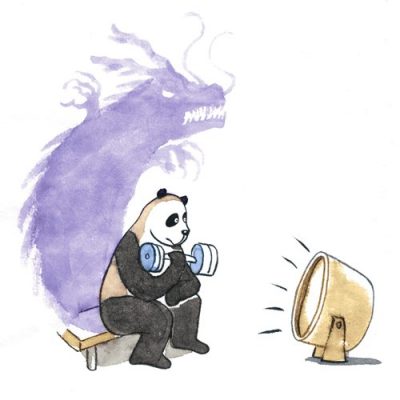Western Elites Find New ‘China Threat’ Theory

The world has been keeping an eye on China for the past 40 years, with adulation and anxiety. Last month, Western mainstream media outlets including the US’ TIME, France’s Le Monde and Germany’s Der Spiegel chose Chinese characters or pinyin for their cover headlines, showing the world that “China won;” China, a rising power; and “China: The Awakening Giant.”
Der Spiegel used “xing lai” (wake up in English) as its cover headline to echo its article “The Awakening Giant.” On the one hand, it declared that China had become an awakening giant and US President Donald Trump’s visit to the country this month was a “kowtow” to China, or even a farewell tour to hand over the leadership of the world.
On the other hand, Der Spiegel urged the West to wake up as soon as possible and unitedly respond to a rising China. Unlike in the past, the German magazine admitted that China had made noticeable achievements on many fronts. However, these achievements were interpreted as threats of value and system to the West, another version of the “China threat” theory.
When the Western media used the “China threat” theory in its propaganda, they thought China would not rise so quickly. But now, they see an increasingly powerful China that has crossed the threshold of a superpower and is outpacing the West on many fronts including politics, economy, technology and culture. Der Spiegel displays a mind-set that believes China and the West will always confront each other.
Some Western elites shuttle between the “China collapse” theory and the “China threat” theory to choose a perspective to observe China’s development, leading to creative titles and themes: as for the economy, Lester Brown, president of the Earth Policy Institute, posed a question in 1995 – “Who Will Feed China?”, claiming growing Chinese demand will “place new strains on world food supply already stretched to the limit.” The reality is that China not only fed its huge population, but also fed the world with over 30 percent contribution to current global economic growth.
As for the system, there were once arguments on who will rescue China that has an “unsustainable economy.” Moreover, it was said that only by following the Western political system can China actually become a developed country. But it turned out that hardly any country which undertook reforms urged by Western elites could develop well. Instead, such countries suffered setbacks or even came to the brink of collapse. Even the West has realized that its system is not only unable to save China but is itself under scrutiny.
The West is reluctant to see an increasingly confident China unwaveringly pursue its own path. As a result, the voice of “who will fight against China” is getting increasingly louder among the Western media. All hopes are placed on the US and its president.
However, Trump, with his “America First” thinking, seems to have no interest in the ideological preferences of Western elites. Hence, angry Western elites portrayed Trump as a president “kowtowing” to woo China.
In order to bring Trump back to the fight against China, they portrayed China’s development and mightiness as a threat to the West, naturally to the US, attributing new meanings and intentions to the upgraded the “China threat” theory.
It’s normal for the West to misunderstand China as they have different values. The Western elites berating China may need to seek wisdom from their predecessors.
If history has it right, French emperor Napoleon Bonaparte once predicted China’s rise and warned British envoys not to conquer the country but seek mutual benefit. Former German chancellor Helmut Schmidt also warned that the West did not have the right to accuse China of going its own way. Instead, it should show respect for this ancient civilization and its modern reforms and development, and never mistake China.
The error in judging China puts the West in an ideological trap. Instead of drawing wisdom from its reform and development program, the Western elite have a confrontational mind-set and try to hinder China’s development. It may be a temporary setback for China’s development, but cannot affect the general direction of the development.
The new version of the “China threat” theory is meant to stir up trouble, especially to provoke China and the US to go on a confrontational course. If the conspiracy succeeds, the world will be immersed in chaos. China doesn’t need to care about the new threat theory or collapse theory. Development is of overriding importance.
The author is a scholar with Shanghai International Studies University. [email protected]
Featured image is from Liu Rui/GT.

